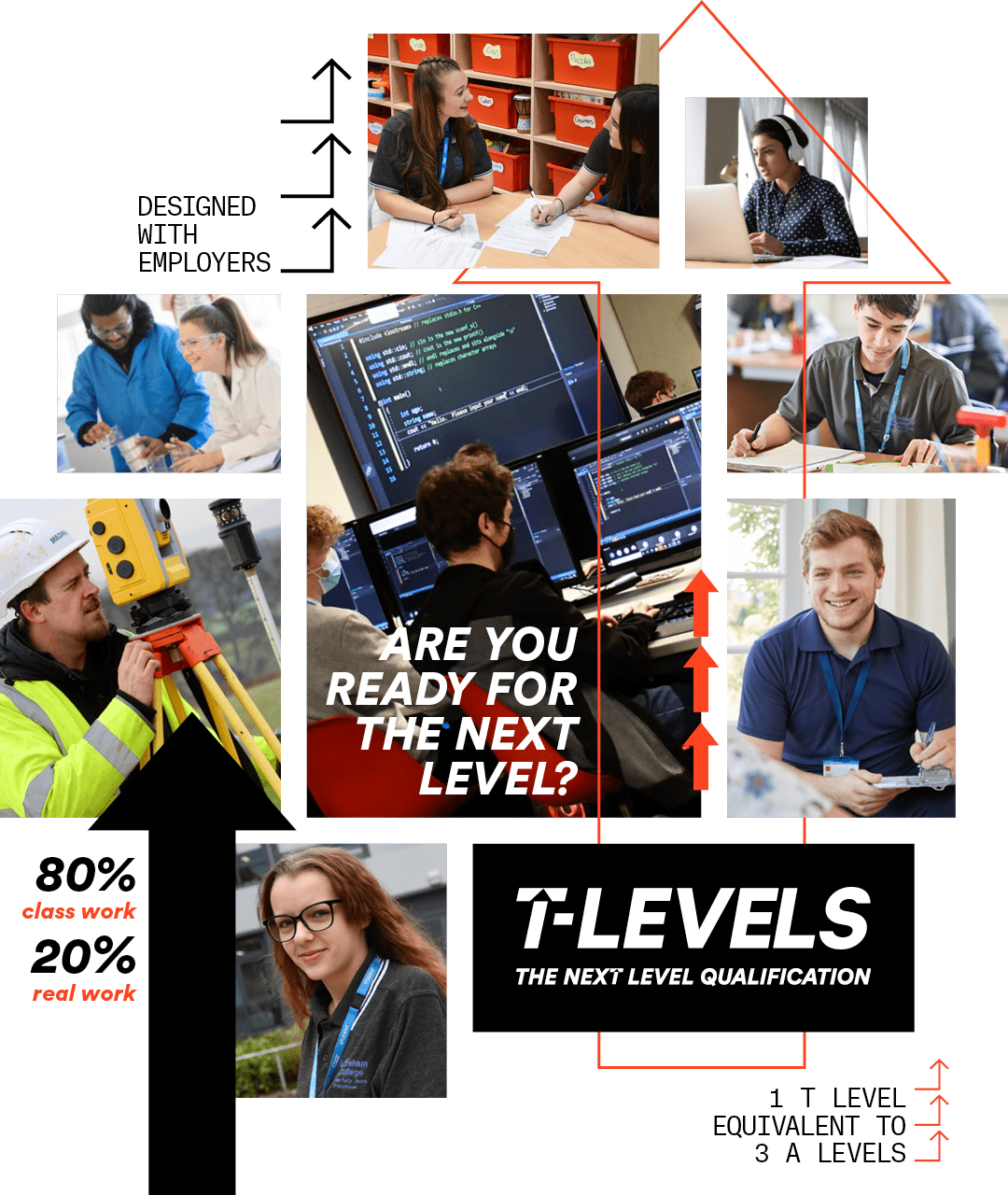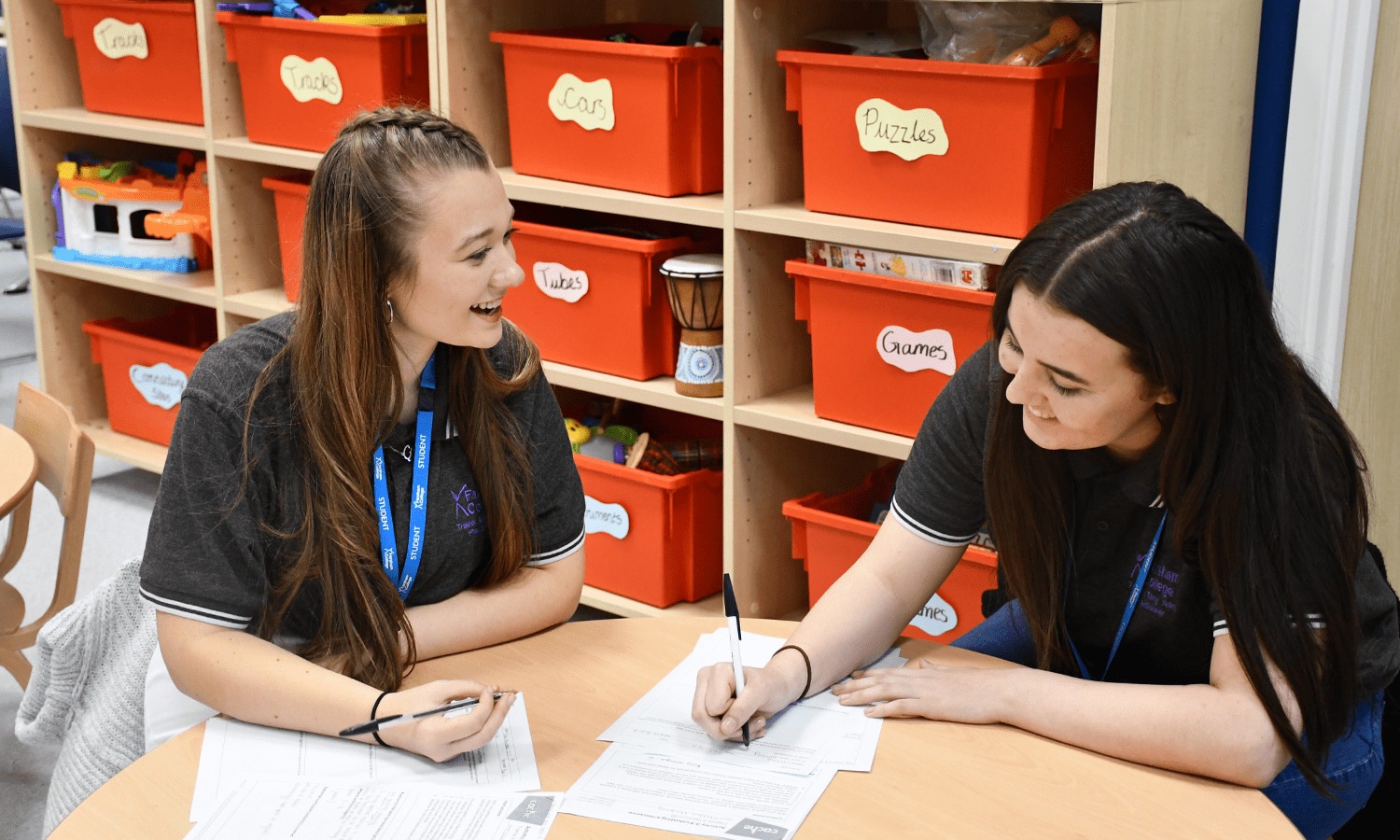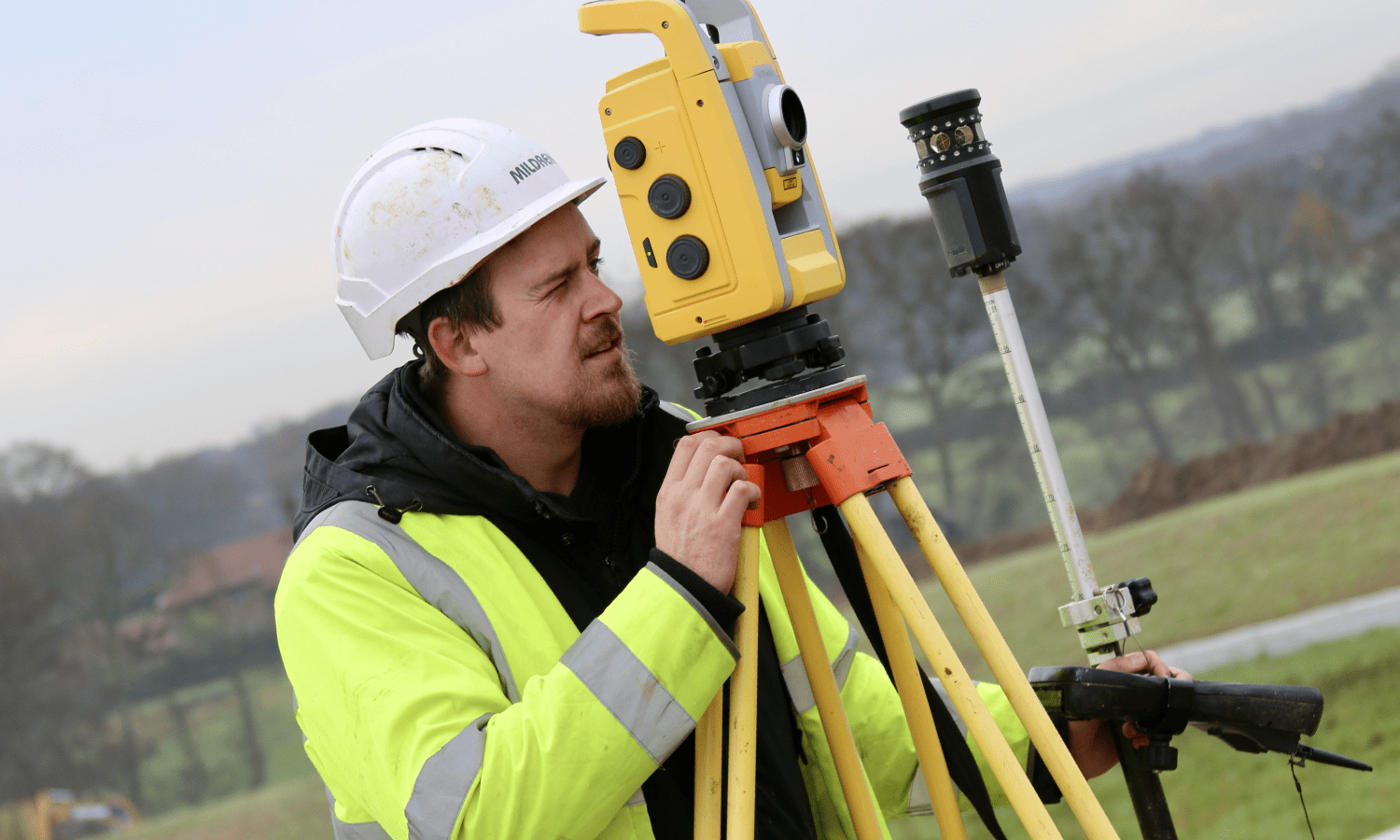Filter Categories
All
Media Production
Health & Science
Art, Design & Fashion
Business, Finance & Enterprise
Civil Engineering & Groundworks
Computing, IT & Game Development
Construction Trades
Early Years & Education
Engineering & Manufacturing
Pre T-Level
-
 Level 3 T Level in Digital Production, Software Design & DevelopmentLevel 3 T Level in Digital Production, Software Design & Development
Level 3 T Level in Digital Production, Software Design & DevelopmentLevel 3 T Level in Digital Production, Software Design & Development -
 Level 3 T Level in Design, Surveying & Planning (Construction)Level 3 T Level in Design, Surveying & Planning (Construction)
Level 3 T Level in Design, Surveying & Planning (Construction)Level 3 T Level in Design, Surveying & Planning (Construction) -
 Level 3 T Level in Health & Science Supporting the Care of Children and Young PeopleLevel 3 T Level in Health & Science Supporting the Care of Children and Young People
Level 3 T Level in Health & Science Supporting the Care of Children and Young PeopleLevel 3 T Level in Health & Science Supporting the Care of Children and Young People -



 Level 3 T Level in Health & Science Laboratory SciencesLevel 3 T Level in Health & Science Laboratory Sciences
Level 3 T Level in Health & Science Laboratory SciencesLevel 3 T Level in Health & Science Laboratory Sciences -



 Level 3 T Level in Health & Science Supporting Therapy TeamsLevel 3 T Level in Health & Science Supporting Therapy Teams
Level 3 T Level in Health & Science Supporting Therapy TeamsLevel 3 T Level in Health & Science Supporting Therapy Teams -
 Level 3 T Level in Legal, Finance & Accounting (Accounting Pathway)Level 3 T Level in Legal, Finance & Accounting (Accounting Pathway)
Level 3 T Level in Legal, Finance & Accounting (Accounting Pathway)Level 3 T Level in Legal, Finance & Accounting (Accounting Pathway) -

-
 Level 3 T Level in Building Services Engineering for Construction (Heating and Plumbing Specialism)Level 3 T Level in Building Services Engineering for Construction (Heating and Plumbing Specialism)
Level 3 T Level in Building Services Engineering for Construction (Heating and Plumbing Specialism)Level 3 T Level in Building Services Engineering for Construction (Heating and Plumbing Specialism) -
 Level 3 T Level in Design & Development for Engineering & Manufacturing (Mechanical)Level 3 T Level in Design & Development for Engineering & Manufacturing (Mechanical)
Level 3 T Level in Design & Development for Engineering & Manufacturing (Mechanical)Level 3 T Level in Design & Development for Engineering & Manufacturing (Mechanical) -

-

-
 Pre T Level in Craft & Design (Fashion Pathway)Pre T Level in Craft & Design (Fashion Pathway)
Pre T Level in Craft & Design (Fashion Pathway)Pre T Level in Craft & Design (Fashion Pathway) -

-
 Level 3 T Level Legal Finance and Accounting (Legal Pathway)Level 3 T Level Legal Finance and Accounting (Legal Pathway)
Level 3 T Level Legal Finance and Accounting (Legal Pathway)Level 3 T Level Legal Finance and Accounting (Legal Pathway) -
 Pre T Level in Media, Broadcasting and ProductionPre T Level in Media, Broadcasting and Production
Pre T Level in Media, Broadcasting and ProductionPre T Level in Media, Broadcasting and Production -
 Level 3 T Level in Craft & Design (Fashion Pathway)Level 3 T Level in Craft & Design (Fashion Pathway)
Level 3 T Level in Craft & Design (Fashion Pathway)Level 3 T Level in Craft & Design (Fashion Pathway) -
 Level 3 T Level in Business Management & AdministrationLevel 3 T Level in Business Management & Administration
Level 3 T Level in Business Management & AdministrationLevel 3 T Level in Business Management & Administration -
 Level 3 T Level in Media, Broadcasting and ProductionLevel 3 T Level in Media, Broadcasting and Production
Level 3 T Level in Media, Broadcasting and ProductionLevel 3 T Level in Media, Broadcasting and Production -
 Level 3 T Level in Education & Childcare (Assisting Teaching)Level 3 T Level in Education & Childcare (Assisting Teaching)
Level 3 T Level in Education & Childcare (Assisting Teaching)Level 3 T Level in Education & Childcare (Assisting Teaching) -
 Level 3 T Level in Education & Childcare (Early Years & Childcare)Level 3 T Level in Education & Childcare (Early Years & Childcare)
Level 3 T Level in Education & Childcare (Early Years & Childcare)Level 3 T Level in Education & Childcare (Early Years & Childcare) -
 Level 3 T Level in Education & Childcare (Supporting & Mentoring Students in Educational Settings)Level 3 T Level in Education & Childcare (Supporting & Mentoring Students in Educational Settings)
Level 3 T Level in Education & Childcare (Supporting & Mentoring Students in Educational Settings)Level 3 T Level in Education & Childcare (Supporting & Mentoring Students in Educational Settings) -
 Level 3 T Level in Supporting Healthcare (Adult Nursing)Level 3 T Level in Supporting Healthcare (Adult Nursing)
Level 3 T Level in Supporting Healthcare (Adult Nursing)Level 3 T Level in Supporting Healthcare (Adult Nursing) -
 Level 3 T Level in Supporting Healthcare (Mental Health)Level 3 T Level in Supporting Healthcare (Mental Health)
Level 3 T Level in Supporting Healthcare (Mental Health)Level 3 T Level in Supporting Healthcare (Mental Health) -
 Level 3 T Level in Building Services Engineering for Construction (Electrotechnical Engineering Specialism)Level 3 T Level in Building Services Engineering for Construction (Electrotechnical Engineering Specialism)
Level 3 T Level in Building Services Engineering for Construction (Electrotechnical Engineering Specialism)Level 3 T Level in Building Services Engineering for Construction (Electrotechnical Engineering Specialism) -
 Level 3 T Level in Design & Development for Engineering & Manufacturing (Electrical)Level 3 T Level in Design & Development for Engineering & Manufacturing (Electrical)
Level 3 T Level in Design & Development for Engineering & Manufacturing (Electrical)Level 3 T Level in Design & Development for Engineering & Manufacturing (Electrical) -

-
 Level 3 T Level in Supporting Healthcare (Midwifery)Level 3 T Level in Supporting Healthcare (Midwifery)
Level 3 T Level in Supporting Healthcare (Midwifery)Level 3 T Level in Supporting Healthcare (Midwifery)







